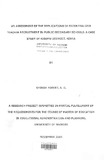An assessment of the implications of decentralized teacher recruitment in public secondary schools: a case study of Kisumu district, Kenya

View/
Date
2004-11Author
Okinda, Robert A O
Type
ThesisLanguage
enMetadata
Show full item recordAbstract
In Kenya, teachers were employment by various organizations - the government and missionary organizations and later teachers came under County Councils and Municipal Councils (Kimalat, 1998). The government and the teachers experienced problems that necessitated putting teachers under the Teachers Service Commission " (TSC)- for all purposes of management of the affairs of teachers (Kimalat, 1998; Sifuna et al 1992). In the year 2001, the TSC decided to de-concentrate its recruitment function to its agents, Boards of Governors for secondary schools and District Education Boards for primary schools.
Soon after the recruitment exercise was launched, there were hue and cries that favoritism, nepotism, bribery, manipulation and external influence bedeviled the process. The decentralization policy was intended to improve learning outcomes for the institutions in that schools were not only given an opportunity to recruit the best but also hire individuals who are prepared to work in specific stations for a minimum of five years. There was, however, evidence that some Boards of Governors (BoG) had not fully grasped the essence of decentralization, especially recruitment of teachers.
The study analyzed four issues, namely; knowledge of the panel members on recruitment of teachers, recruitment trends and the extent to which they satisfy staffing needs, problems encountered during the recruitment exercise and the possible solutions to the problems encountered during the recruitment exercise.
The study used information gathered from the secretary to the recruitment panel, that is, the head teachers of public secondary schools in Kisumu District, Nyanza Province, Kenya. Information was also gathered from senior education officials in the district.
Data were collected through questionnaires, interviews and document study. Data were analyzed using descriptive statistics. The implications of decentralizing recruitment of teachers to BoG was assessed by its corollary on the management structure at the school level, structure of public authority at the local level, monitoring and evaluation and, mechanism for sharing functions and powers.
The findings of the study indicated that recruitment at the school level reduced workload at the TSC headquarters and at the same time, head teachers were satisfied with the extent to which their staffing needs were met. The head teachers were, however, not satisfied with the current trend whereby teachers are recruited once in a year. The education officials, trade union officials and the head teachers were in
agreement that the panel members' capacity be enhanced to enable them carry out the tasks bestowed upon therr: effectively and efficiently.
The study recommends a mix of political will (policymakers working together with stakeholders), technical inputs (competent policies and personnel in education) and economic factors (adequate resources) as imperatives for the recruitment exercise to be efficient and effective. At the same time, there should be congruency between 'bottom-up' and 'top-down' principles, emphasizing expertise, rights, and power of local communities while taking into account context and constraints.
Decentralization of teacher recruitment should not take place where institutional capacity is weak, where democratic institutions are fragile and resources are scarce.
Sponsorhip
University of NairobiPublisher
School of Education, University of Nairobi
Collections
- Faculty of Education (FEd) [6022]
